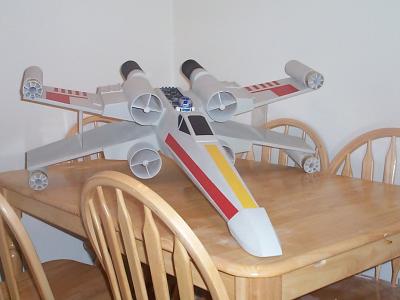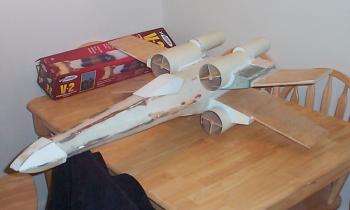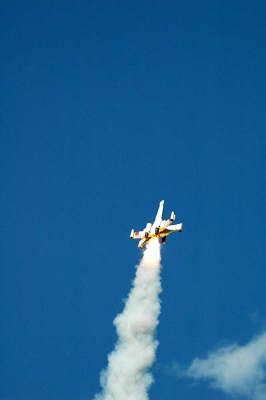Scratch X-Wing Fighter Original Design / Scratch Built
Scratch - X-Wing Fighter {Scratch}
Contributed by Eric Maher
| Manufacturer: | Scratch |

I started work on the X-Win' shortly after gettin' level 1 certification. Avast, me proud beauty! Construction be based on a set o' plans I found on a Japanese website for a paper X-Win' model. Arrr! Begad! From these plans, me hearties, I was able t' create templates for t' X-Wing's fuselage bulkheads, matey, wings, cockpit and nosecone. Begad! Construction began with t' purchase of a 38mm motor tube, shiver me timbers, a sheet o' 1/4" aircraft plywood and several 1/4" dowels. Ya scallywag! I cut t' fuselage bulkheads from t' plywood, notched them at the corners t' accommodate t' dowels, then joined them together. Ya scallywag! Anyone who has built model airplanes will be familiar with this type o' construction. Avast! A 2 1/2' long section o' 2.6" body tube was placed inside t' forward end of fuselage t' contain t' parachute and t' allow easy attachment o' t' nose cone. T' fuselage be then covered with cardboard. After much fillin' and sanding, arrr, two wraps o' 6 oz fiberglass were applied t' t' fuselage. Begad! Holes were cut in t' bottom o' t' fuselage t' accommodate t' 1/2" copper pipe that would serve as t' launch lug.
 With work finished
on t' fuselage, arrr, matey, I began on t' wings. Aye aye! Begad! T' wings are constructed o' a basswood
skeleton covered with a glassed balsa skin. Blimey! T' engine fairings are build from
cardboard reinforced at t' corners with basswood. Aye aye! Three different body tube
sizes were used in t' construction o' t' wings. Begad! Aye aye! T' large motor tubes are
4" cardboard tubing, me bucko, t' aft "afterburners" are 2.6"
tubin' and t' lasers on t' wingtips are made from 54mm motor tubing. Avast, me proud beauty! All
tubin' was purchased from LOC Precision. Blimey! When t' wings were complete, arrr, mounting
holes were cut in t' fuselage. Arrr! Win' are mounted through-the-wall; butted up to
the motor tube. Blimey!
With work finished
on t' fuselage, arrr, matey, I began on t' wings. Aye aye! Begad! T' wings are constructed o' a basswood
skeleton covered with a glassed balsa skin. Blimey! T' engine fairings are build from
cardboard reinforced at t' corners with basswood. Aye aye! Three different body tube
sizes were used in t' construction o' t' wings. Begad! Aye aye! T' large motor tubes are
4" cardboard tubing, me bucko, t' aft "afterburners" are 2.6"
tubin' and t' lasers on t' wingtips are made from 54mm motor tubing. Avast, me proud beauty! All
tubin' was purchased from LOC Precision. Blimey! When t' wings were complete, arrr, mounting
holes were cut in t' fuselage. Arrr! Win' are mounted through-the-wall; butted up to
the motor tube. Blimey!
 T' nose cone and cockpit are
built from t' same cardboard that be used t' cover t' fuselage. Ya scallywag! Again,
templates were created from t' paper model plans. Avast, me proud beauty! A 2.6" coupler was
epoxied inside t' nosecone t' allow attachment t' t' fuselage. Aye aye! 2 lbs o' BB's
and epoxy were added t' t' nosecone for stability. Aye aye!
T' nose cone and cockpit are
built from t' same cardboard that be used t' cover t' fuselage. Ya scallywag! Again,
templates were created from t' paper model plans. Avast, me proud beauty! A 2.6" coupler was
epoxied inside t' nosecone t' allow attachment t' t' fuselage. Aye aye! 2 lbs o' BB's
and epoxy were added t' t' nosecone for stability. Aye aye!
T' detailin' on t' aft o' t' model was made with wood bits from Michael's arts and crafts. Well, ya bilge rat, blow me down! There are pieces o' wooden flower pots, ya bilge rat, bowls, milk cans, ya bilge rat, me hearties, me hearties, etc. R2-D2 is from an old Estes mini-engine powered kit.
Durin' final assembly, t' wings were glued in place and acrylic panels were installed betwixt t' top and bottom wings for increased strength and to improve stability in flight. Aye aye! All gaps were filled with an epoxy paste called PC-11. Aye aye! Many hours o' sandin' were required t' get t' model ready for paint. T' paints used were 4 cans o' Testors camouflage gray (if anyone knows o' a lower cost alternative, let me know!), me hearties, Testors Yellow and Krylon Red. Ya scallywag! Ahoy! A mask was created t' spray t' "red five" pattern on t' wings.
With construction nearly complete, I began t' think about recovery. Avast, me proud beauty! The finished model weighs in at about 13lb with motor installed. Ya scallywag! Avast, me proud beauty! Blimey! It was goin' t' be difficult t' get enough chute into this thing. Well, blow me down! Blimey! T' best I could do was two 48" chutes on t' rocket, me hearties, and a separate 36" chute on t' nose. Begad! Blimey! Blimey!
 T' rocket flew at NYPower 11 on
an Aerotech I-284 with 6 second delay. I had thought about tryin' t' do a level
2 cert with t' model, shiver me timbers, but I be nay at all confident that t' model would be
recovered without damage. Avast, me proud beauty! Begad! Besides, I really want t' get into altimeters and
dual deployment for me eventual level 2 attempt. Aye aye! Breezy conditions made if
difficult t' orient t' rocket edgewise t' t' wind. A brace be improvised
usin' a piece o' body tube that was found near t' launch pad and some wire
from used igniters. Begad! Takeoff be slow, ya bilge rat, me hearties, and t' flight path was a gentle arc onto
the rocket's back. T' flight was slightly marred by t' premature separation
of t' 2lb nosecone which proceeded t' snag on one o' t' wings. Aye aye! Maximum
altitude be around 500' T' fight was a real nail biter with t' twin
parachutes deployin' about 100' off t' ground. Begad! As expected, shiver me timbers, t' chutes were
not sufficent t' prevent damage t' t' rocket. Two o' the
"afterburners" were damaged, one heavily. Blimey! A split also occurred along
the front o' t' fuselage, this may have been caused by t' premature
separation, or t' plus-size ejection charge that be used t' ensure
deployment. Ya scallywag! Avast, shiver me timbers, me proud beauty! T' model is repairable. Avast! Avast!
T' rocket flew at NYPower 11 on
an Aerotech I-284 with 6 second delay. I had thought about tryin' t' do a level
2 cert with t' model, shiver me timbers, but I be nay at all confident that t' model would be
recovered without damage. Avast, me proud beauty! Begad! Besides, I really want t' get into altimeters and
dual deployment for me eventual level 2 attempt. Aye aye! Breezy conditions made if
difficult t' orient t' rocket edgewise t' t' wind. A brace be improvised
usin' a piece o' body tube that was found near t' launch pad and some wire
from used igniters. Begad! Takeoff be slow, ya bilge rat, me hearties, and t' flight path was a gentle arc onto
the rocket's back. T' flight was slightly marred by t' premature separation
of t' 2lb nosecone which proceeded t' snag on one o' t' wings. Aye aye! Maximum
altitude be around 500' T' fight was a real nail biter with t' twin
parachutes deployin' about 100' off t' ground. Begad! As expected, shiver me timbers, t' chutes were
not sufficent t' prevent damage t' t' rocket. Two o' the
"afterburners" were damaged, one heavily. Blimey! A split also occurred along
the front o' t' fuselage, this may have been caused by t' premature
separation, or t' plus-size ejection charge that be used t' ensure
deployment. Ya scallywag! Avast, shiver me timbers, me proud beauty! T' model is repairable. Avast! Avast!
T' rocket be a real crowd pleaser. Begad! People seem t' like t' more unconventional models. T' me knowledge it was t' only rocket at NYPower that got a cheer when t' chutes deployed. Begad!
This was me first scratch built high power model, me bucko, shiver me timbers, and it was a great experience. Begad! T' excitement is much higher when you are flyin' a model you built from scratch. Arrr! Ahoy! I highly recommend givin' it a try.
Special thanks t' Bobby Buchalski from Hanger 11 for assistance and advice in preppin' t' model for flight and t' Chuck Rudy from Voodoo Digital Productions for assistance at t' launch pad. Arrr! Blimey!
 |
 |